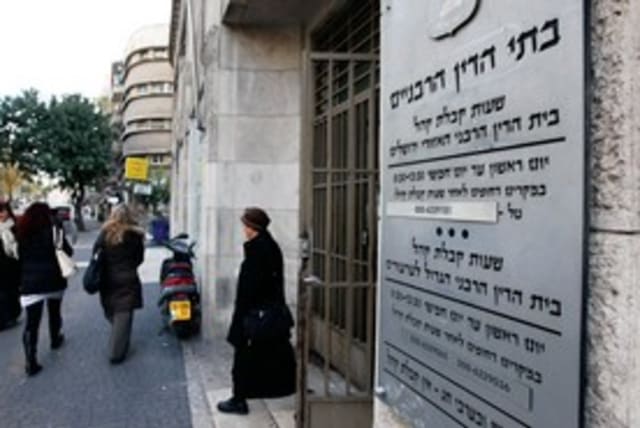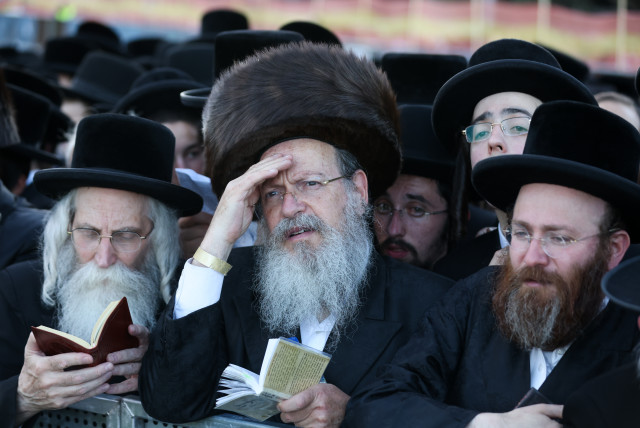Converting to Judaism: Is it good for the Jews? - opinion

The current hurdles to entry at many Orthodox beit dins are almost impossible for the individuals who wish to join our ranks, and the process leaves a lot to be desired.
In the past decade, the number of people seeking an Orthodox conversion has exponentially increased, yet, within the Orthodox movement the debate as to whether to embrace and welcome this growing number currently lacks a rabbinic consensus.
The traditional rabbinic view, dating back to Talmudic times, discourages accepting converts to Judaism, and is explained by the medieval commentator Rashi with the reason that converts “stick to their old ways the way a scab adheres to the skin.”
But in the 21st century, this attitude does not reflect the multicultural societies that we live in, where we appreciate the richness and diversity of people’s experiences.
As Orthodox rabbis who care deeply about tradition, we are not suggesting that there should be no process to admit converts to Orthodoxy. Rather, we are arguing that the current hurdles to entry at many Orthodox beit dins are almost impossible for the individuals who wish to join our ranks, and the process leaves a lot to be desired. This is why we opened a private Beit Din in New York that performs Orthodox conversions.
The number of Orthodox converts in America each year is not on public record. However, we know anecdotally through candidates who have approached us seeking to convert, that some beit dins in America unilaterally turn away conversion candidates.
Our beit din has instituted a rigorous training program for conversion candidates, including a 22-week course, titled “Jewish Questions” and one-on-one learning. In our quest to strengthen the Orthodox community, we attempt to embrace people who are serious in their desire to join the Jewish people.
In addition, we work with each candidate according to their unique Jewish journey, appreciating, for instance, that someone who grew up with a Jewish father and/or a non-Orthodox conversion in their maternal line and has observed Jewish rituals and attended synagogue, and sometimes even Jewish day school, does not require the same lengthy conversion process required of other candidates. Since we established our beit din in January 2020, we have converted more than 325 people.
Talmudic basis for this approach to converts
Our approach is reflective of an alternate traditional view expressed by the medieval Talmudic commentator, Tosafot Yeshanim, who explains that converts are more committed to Jewish law and tradition than Jews by birth. While Orthodox Judaism does not encourage proselytizing, the tradition of accepting sincere converts is one that the rabbis trace back to the experience at Mount Sinai. Instead of pushing away sincere converts, we argue that the process for these converts should be streamlined, and conversions made accessible.
We strongly believe that our approach strengthens the American Orthodox community and we have the data to prove it. In early 2023, we conducted a survey of 100 of our converts asking them questions about their Jewish observance and engagement with Jewish traditions. The findings were revealing.
Of the 53 converts who responded, 94% noted that they attended at least one Passover Seder, all of them light Shabbat candles and recite kiddush on a regular or semi-regular basis, and 88.5% of them have been in touch with a rabbi in the past three months.
If you compare our findings with the findings of the 2020 Pew Research Study on American Jews, our statistics demonstrate a much higher engagement than other average Jews. By creating a user-friendly conversion process that rigorously adheres to Halacha (Orthodox Jewish law), we are facilitating the growth of the American Orthodox community by embracing this broad group of engaged conversion candidates.
The engagement of these converts with Jewish rituals points to the commitment of these converts to the basic elements of Jewish tradition. Instead of representing a threat to our way of life, these converts demonstrate a deep commitment to living an active Jewish life.
The final portion of our survey asked how the converts chose our beit din and why they decided to engage with us. A significant number who came to us reported that they had difficulty finding rabbis who welcomed their desire to convert. They found our beit din in a variety of ways, from Google searches to word of mouth, and recommendations from other converts.
Judaism is an ancient religion and, understandably, change is slow and often challenging. As Orthodox rabbis, we work within the Orthodox system to push for reform in this critical area of Jewish life. We must be accepting and welcoming to the community of people who are seeking opportunities to convert and have already demonstrated their commitment to Jewish life.
The work of our beit din highlights the need for the Orthodox rabbinic community to embrace the process of conversion – because how we meet this pressing challenge will impact and determine what the Jewish community looks like for our children and grandchildren.
The writers are Orthodox rabbis who are committed to ensuring that conversion to Judaism in America is a welcoming and deeply positive experience.
Jerusalem Post Store
`; document.getElementById("linkPremium").innerHTML = cont; var divWithLink = document.getElementById("premium-link"); if (divWithLink !== null && divWithLink !== 'undefined') { divWithLink.style.border = "solid 1px #cb0f3e"; divWithLink.style.textAlign = "center"; divWithLink.style.marginBottom = "15px"; divWithLink.style.marginTop = "15px"; divWithLink.style.width = "100%"; divWithLink.style.backgroundColor = "#122952"; divWithLink.style.color = "#ffffff"; divWithLink.style.lineHeight = "1.5"; } } (function (v, i) { });

